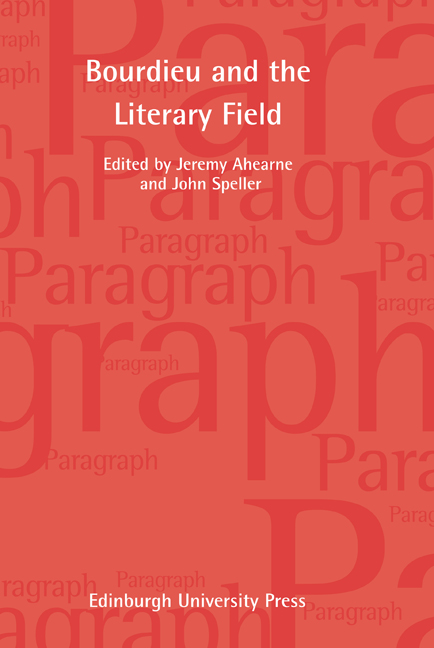Book contents
- Frontmatter
- Contents
- Introduction: Bourdieu and the Literary Field
- How Field Theory Can Contribute to Knowledge of World Literary Space
- Autonomy Revisited: The Question of Mediations and its Methodological Implications
- The Literary Field and the Field of Power: The Case of Modern China
- Between Repression and Anamnesis: Pierre Bourdieu and the Vicissitudes of Literary Form
- Reading and Reflexivity: Bourdieu’s Faulkner
- Fields and Fragments: Bourdieu, Pascal and the Teachings of Literature
- On an Enigmatic Text by Pierre Bourdieu
- Apollinaire, Autumn Ill
- Notes on Contributors
Fields and Fragments: Bourdieu, Pascal and the Teachings of Literature
Published online by Cambridge University Press: 17 September 2020
- Frontmatter
- Contents
- Introduction: Bourdieu and the Literary Field
- How Field Theory Can Contribute to Knowledge of World Literary Space
- Autonomy Revisited: The Question of Mediations and its Methodological Implications
- The Literary Field and the Field of Power: The Case of Modern China
- Between Repression and Anamnesis: Pierre Bourdieu and the Vicissitudes of Literary Form
- Reading and Reflexivity: Bourdieu’s Faulkner
- Fields and Fragments: Bourdieu, Pascal and the Teachings of Literature
- On an Enigmatic Text by Pierre Bourdieu
- Apollinaire, Autumn Ill
- Notes on Contributors
Summary
Abstract:
Literary pedagogy occupied a privileged place in Bourdieu's early work on education insofar as he saw it as exemplifying in unconscious mode socially segregational dynamics. Bourdieu's expressly ‘reductionist’ critique was uncannily mirrored, however, by the spread of more economically instrumental approaches to education. Bourdieu's engagement with these led him to develop a fuller apprehension of literature. Yet while the conceptual apparatus he developed can allow the genesis of a literary work in its socio-historical complexity to be grasped more fully, its framing poses significant problems of its own. In particular, its ‘hypercontextualizing’ injunctions risk stifling ordinary reading practices and the practical pedagogy of canon-formation. Bourdieu’s actual practice with literary materials is not bound by these injunctions. His transepochal ‘collaboration’ with Blaise Pascal, for example, takes place through the insinuation of decontextualised shards of thought into his own writing. The teachings of literature exceed in various ways their scientific framing.
Keywords: Pierre Bourdieu, Blaise Pascal, literature, sociology, education, field theory, fragments
The links between teaching and literatures were a recurrent focus of Bourdieu's thought from the 1960s. Indeed, for much of his writing that nexus appears as a target. Literatures are understood within these domains of his thought in a composite manner, both in the sense of pedagogical corpuses serving class-and nation-based cultural strategies, and as the products of strategies of ‘distinction’ within increasingly self-conscious and relatively autonomous fractions of an artistic ‘field’ (the relations between these two dimensions are also explored by Bourdieu). The posture Bourdieu adopts in this regard is external or ‘objectifying’: he is the ‘scientist’ of a society’s serious ‘games’ whose invisible mechanisms need ‘explicating’. But Bourdieu is himself implicated in a rather different kind of relation to a ‘literature’ derived from the processes evoked above but apprehended in a different mode. This relation is largely unthematized as such in his work, but is a constant feature of his thinking practice. Literature here signifies something like a precipitation of dislocated textual fragments whose current status is uncertain (not scientific, not documentary, not immediately instrumental), but which condition and enable certain kinds of perception. Bourdieu, the product of a certain kind of education and self-education, carries them around with him: they are ingrained into his disposition (his habitus). They draw out (educt) his understanding in particular ways.
- Type
- Chapter
- Information
- Bourdieu and the Literary FieldParagraph Volume 35, Number 1, pp. 97 - 114Publisher: Edinburgh University PressPrint publication year: 2020



